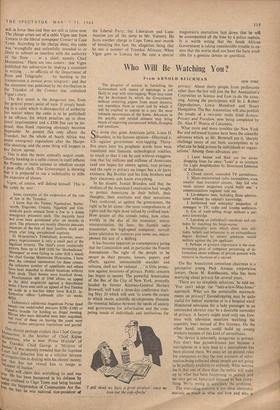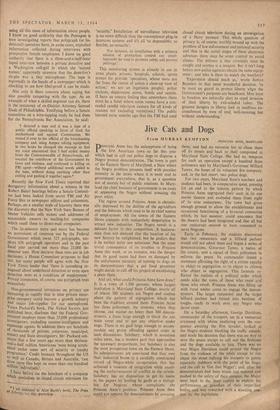You ? Who Will Be Watching From ARNOLD BEICHMAN
NEW YORK
The progress of science in furnishing the Government with means of espionage is not likely to stop with wire-tapping. Ways may some day be developed by which the Government, without removing papers from secret drawers, can reproduce them in court and by which it will be enabled to expose to a jury the most intimate occurrences of the home. Advances in the psychic and related sciences may bring means of exploring unexpressed beliefs, thoughts and emotions.
So wrote that great American jurist, Louis D. Brandeis, in his famous opinion—Olmstead v. US—against government wire-tapping. Thirty- five years later his prophetic words have been translated into fantastic technological realities; so much so that it can be said without exaggera- tion that for millions and millions of Americans (and one hopes for enemy agents, too) privacy and the right to privacy no longer has a de facto existence. Big Brother and his little brothers and their electronic aids know everything.
In his dissent, Justice Brandeis said that the drafters of the American Constitution had 'sought to protect Americans in their beliefs, their thoughts, their emotions and their sensations. They conferred, as against the government, the right to be let alone—the most comprehensive of rights and the right most valued by civilised men.' How quaint all this sounds today, hoW other- worldy in the day of the transistor, micro- miniaturisation. the laser,, the lipstick radio transmitter, the high-speed computer, surveil- lance television by cameras you never see, micro- phones the size of a shilling.
It has become apparent to contemporary jurists that the Constitution and, in particular the Fourth Amendment—'the right of the people to be secure in their persons, houses, papers, and effects, against unreasonable searches and seizures, shall not be violated ...' is little protec- tion against invasions of privacy. Public concern has begun to mount. The powerful Association of the Bar of the City of New York, presently headed by former Attorney-General Herbert Brownell, will hold a three-day conference start- ing May 24 which will seek 'to assess the extent to which recent scientific developments threaten the essential balance between the needs of society and government for information and the com- peting needs of individuals and institutions for 'I still think we have a great product—once we iron out the side-effects.' privacy.' About thirty people from professions other than the law will join the Bar Association's Committee on Science and Law to do the asses- sing. Among the participants will be J. Robert Oppenheimer, Lewis Mumford and Stuart Hampshire. The Bar Association will also publish the results of a two-year study titled Science, Privacy and Freedom, now being completed by Dr. Alan F. Westin of Columbia.
What more and more troubles the New York Bar and informed laymen have been the scientific advances which, as Mr. Brownell put it, 'sharply challenge many of our basic assumptions as to what can be held private by individuals or organi- sations.' Among these advances are:
1. Laser beams and their use for eaves- dropping from far away. 'Laser' is an acronym for Light Amplification by Stimulated Emission of Radiation.
2. Closed circuit, concealed TV surveillance.
3. Micro-miniaturised radio transmitters, even smaller than transistor circuits. 'Any kid who reads science magazines could build one,' a communications engineer told me.
4. Lie-detector tests, including those adminis- tered without the subject's knowledge.
5. Subliminal and subaudial projection of messages to TV, radio and cinema audiences.
6. Use of truth-telling drugs without a per- son's knowledge.
7. Learning an individual's emotions and atti- tudes by watching his brain-waves.
8. Personality tests which delve into atti- tudes, beliefs and behaviour to an extraordinary degree. Refusal to answer questions would militate against the job applicant.
9. Perhaps of greatest importance is the ever- increasing pace of computer processing of in- formation about millions of private persons with retrieval in fractions of a second.
The Bar Association committee chairman is a perceptive' young Park Avenue corporation lawyer, Oscar M. Ruebhausen, who has been worrying about privacy for several years.
'There are no simplistic solutions,' he told me. 'You can't adopt the "take-a-law-Miss-Jones" approach. What are the permissible encroach- ments on privacy? Eavesdropping may be quite useful for babies' nurseries or in a hospital ward. Monitored television for a lady passenger in an unattended elevator may be a desirable surrender of privacy. A factory might need only one fore- man with television monitors watching the assembly lines instead of five foremen. On the other hand, tension could build up among workers because of this kind of surveillance.
'No device is inherently dangerous to privacy. You don't ban picture-frames just because a microphone or a wire lead to a microphone has been planted there. We must set up ground rules for computers so that the vast amounts of infor- mation.being collected about people are not going to be publicly available to anybody. What worries me is that one of these days the public *ill wake up to what has been happening to privacy and we may get an hysterical demand to ban every- thing. We're trying to anticipate the problems.'
The overriding concern is not these electronic marvels as much as what and how and who is
using all this mass of information about people. I know on good authority that the Pentagon is now investigating reports that polygraph (or lie- detector) operators have, in some cases, exploited information collected during interviews with prospective female employees. I know on good authority that there is a three-and-a-half-hour taped interview between a private detective and a Washington call-girl in which she 'named names,' apparently unaware that the detective's tie-pin was a tiny microphone. The tape is reportedly in the hands of a newspaper which is checking to see how libel-proof it can be made.
Not only is there concern about taping but also possible tampering with the tape. As an example of what a skilled engineer can do, there is the testimony of ex-District Attorney Samuel. Dash of Philadelphia. Testifying before a Senate committee on a wire-tapping study he had done for the Pennsylvania Bar Association, he said:
`I dictated a tape and it was a tape of a public official speaking in favor of God, for motherhood and against Communism. We turned it over to the official of the broadcasting company and, using Ampex editing equipment, in two hours he changed the message so that my voice announced that I had stolen money from the Commonwealth of Pennsylvania, ad- vocated the overthrow of the Government by force and violence, and confessed to killing an FBI agent—without additional words added to the tape, without doing anything other than cutting and putting it together again.* Recently the New York Times reported that derogatory information about a witness in the Robert Baker hearings before a Senate Commit- tee had been leaked from secret FBI and Air Force files to newspaper editors and columnists. Perhaps, on a smaller scale of knavery there was the discovery that the New York State Bureau of Motor Vehicles sells names and addresses of automobile owners to mailing-list companies which resell them to direct-mail companies.
The lie-detector more and more has become an instrument of common use by the Federal Government which owns 525 polygraphs, em- ploys 656 polygraph operators and in the past fiscal year carried out more than 23,000 lie- detector tests. How decisive these tests are in job decisions, a House Committee proposes to find out, but many people will agree with the New York Times leader that 'there is something re- pugnant about underhand detection or even open detection tests as a condition of employment.' Private companies, of course, use polygraph tests extensively.
Non-governmental intrusions on privacy are increasing so rapidly that in time private enter- prise snoopery could become a growth industry and major job-supplier for our unemployed. Vance Packard's book, The Naked Society, just published here, discloses that the Federal Gov- ernment employs more than 25,000 professional investigators, excluding counter-intelligence and espionage agents. In addition there are hundreds of thousands of private, corporate, municipal, county and State investigators. Mr. Packard esti- mates that a few years ago more than thirteen- and-a-half million Americans 'were being scruti- nised under some sort of security or loyalty Programme.' Credit bureaux throughout the US as Well as Canada, Britain and Australia, 'can draw upon files kept on more than one hundred million individuals.'
have before me the brochure of a company Which specialises in closed circuit television for
*I am indebted to Alan Barth's of Wen's, for this quotation. book, The Price
`security.' Installation of surveillance television is no more difficult than the conventional plug-in intercom systems and it's all 'so dependable, so flexible, so versatile':
'For instance, an installation with a primary mission of production control can simul- taneously be used to promote safety and prevent pilferage.'
This monitoring system is already in use in arms plants, prisons, hospitals, schools, sports arenas (to provide 'spectators, whose seats are far from the centre of action a close-up view of action;' we are an ingenious people), police stations, department stores, hotels and motels. (I have an uneasy feeling that somewhere there must be a hotel where some rooms have a con- cealed candid television camera for all kinds of reasons not excluding voyeurism.) The public learned some months ago that the FBI had used closed circuit television during an investigation of a Navy yeoman. This whole question of privacy is, of- course, terribly wound up with the problem of law enforcement and national security and thus in the initial stages of these electronic advances there may be some control to avoid abuses. The defence is that criminals must be caught and science is a weapon. But it isn't long before non-police agencies obtain the same equip- ment: and who is there to watch the watchers?
'Experience should teach us,' wrote Justice Brandeis in that same wonderful decision, `to be most on guard to protect liberty wken the Government's purposes are beneficent. Men born to freedom are naturally alert to repel invasion of their liberty by evil-minded rulers. The greatest dangers to liberty lurk in insidious en- croachment by men of zeal, well-meaning but without understanding.'



































 Previous page
Previous page